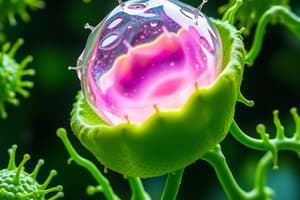Podcast
Questions and Answers
What is the study of ecosystems and their interactions called?
What is the study of ecosystems and their interactions called?
- Ecology (correct)
- Zoology
- Microbiology
- Botany
Cell Theory states that all living things are composed of cells.
Cell Theory states that all living things are composed of cells.
True (A)
What is the process called by which plants convert light energy into chemical energy?
What is the process called by which plants convert light energy into chemical energy?
Photosynthesis
Ionic bonds involve the transfer of ______ between atoms.
Ionic bonds involve the transfer of ______ between atoms.
Match the following chemistry concepts with their definitions:
Match the following chemistry concepts with their definitions:
What is the typical word order in Kiswahili?
What is the typical word order in Kiswahili?
Which prefix indicates the future tense in Kiswahili verb conjugation?
Which prefix indicates the future tense in Kiswahili verb conjugation?
How does the adjective agree with the noun it describes in Kiswahili?
How does the adjective agree with the noun it describes in Kiswahili?
What prefix is commonly used to form negation in Kiswahili verbs?
What prefix is commonly used to form negation in Kiswahili verbs?
Which of the following is a common preposition in Kiswahili that indicates location?
Which of the following is a common preposition in Kiswahili that indicates location?
Flashcards are hidden until you start studying
Study Notes
Biology
- Definition: The study of living organisms and their interactions with the environment.
- Main Branches:
- Zoology: Study of animals.
- Botany: Study of plants.
- Microbiology: Study of microorganisms.
- Ecology: Study of ecosystems and interactions.
- Key Concepts:
- Cell Theory: All living things are composed of cells, the basic unit of life.
- Evolution: Organisms change over time through natural selection.
- Genetics: Study of heredity and variation in organisms, involving DNA and genes.
- Homeostasis: Regulation of internal environment to maintain stable conditions.
- Essential Processes:
- Photosynthesis: Process by which plants convert light energy into chemical energy.
- Cellular Respiration: Process of extracting energy from glucose in cells.
Chemistry
- Definition: The study of matter, its properties, and how it interacts and changes.
- Main Branches:
- Organic Chemistry: Study of carbon-containing compounds.
- Inorganic Chemistry: Study of minerals and non-organic compounds.
- Physical Chemistry: Study of the physical properties and behavior of chemical systems.
- Analytical Chemistry: Techniques to analyze materials.
- Key Concepts:
- Atomic Structure: Atoms are composed of protons, neutrons, and electrons.
- Periodic Table: Organization of elements based on atomic number and properties.
- Chemical Bonds:
- Ionic Bonds: Transfer of electrons between atoms.
- Covalent Bonds: Sharing of electrons between atoms.
- Reactions: Transformations of substances during chemical reactions.
- Essential Principles:
- Conservation of Mass: Mass is neither created nor destroyed in chemical reactions.
- Acids and Bases: Substances classified based on their pH and reactivity; acids donate protons (H+), bases accept protons.
Biology
- Definition: Biology is the study of life, encompassing all living organisms and their interactions with the environment.
- Branches:
- Zoology: The study of animals, their structure, function, behavior, and evolution.
- Botany: The study of plants, including their classification, ecology, and physiology.
- Microbiology: The study of microorganisms, such as bacteria, viruses, and fungi.
- Ecology: Study of ecosystems and the interactions between organisms and their environment.
- Key Concepts:
- Cell Theory: States that all living organisms are composed of cells, which are the fundamental unit of life.
- Evolution: The process by which organisms change over time through natural selection, driven by adaptation to the environment.
- Genetics: The study of heredity and variation in organisms. It focuses on DNA and genes, which carry genetic information.
- Homeostasis: The ability of organisms to maintain a stable internal environment despite external changes, essential for survival.
- Essential Processes:
- Photosynthesis: The process used by plants to convert light energy into chemical energy (sugars) using carbon dioxide and water.
- Cellular Respiration: The process by which cells break down glucose to release energy in the form of ATP for cellular functions.
Chemistry
- Definition: Chemistry is the study of matter and its properties, including how matter interacts and changes.
- Branches:
- Organic Chemistry: Focuses on the study of carbon-containing compounds, including most biological molecules.
- Inorganic Chemistry: Studies substances that do not contain carbon, including minerals and salts.
- Physical Chemistry: Explores the physical properties and behavior of chemical systems, applying physics principles.
- Analytical Chemistry: Develops techniques to analyze the composition and properties of materials.
- Key Concepts:
- Atomic Structure: Atoms are the fundamental building blocks of matter, composed of protons, neutrons, and electrons.
- Periodic Table: A systematic organization of elements based on their atomic number and recurring chemical properties.
- Chemical Bonds:
- Ionic Bonds: Formed by the transfer of electrons between atoms, resulting in charged ions.
- Covalent Bonds: Formed by the sharing of electrons between atoms.
- Reactions: Chemical reactions involve the rearrangement of atoms and molecules, forming new substances.
- Essential Principles:
- Conservation of Mass: In chemical reactions, the total mass of the reactants equals the total mass of the products.
- Acids and Bases: Substances classified based on their pH and reactivity.
- Acids: Donate protons (H+).
- Bases: Accept protons (H+).
Kiswahili Grammar
- Word Order: Subject-Verb-Object (SVO) structure is typical.
- Nouns:
- Classified into classes, with different prefixes for singular and plural.
- Agreement is crucial in adjectives, verbs, and pronouns.
- Common noun classes include:
- Class 1: M-/Wa- (Mtu/Watu - Person/People)
- Class 2: M-/Mi- (Miti - Trees)
- Class 3: N-/N- (Nguvu - Strength)
- Class 4: Ki-/Vi- (Kiti/Viti - Chair/Chairs)
- Verbs:
- Conjugation involves prefixes that indicate the subject and tense.
- Example: "Ninapenda" (I love) vs."Nilitaka" (I wanted).
- Tenses:
- Present: "na-" prefix (e.g., Nakula - I am eating)
- Past: "li-" prefix (e.g., Nilishinda - I won)
- Future: "ta-" prefix (e.g., Nitakula - I will eat)
- Adjectives:
- Must agree in class (singular/plural) and number with the noun they describe.
- Example: Mzuri (good) becomes Wazuri for plural nouns.
- Prepositions:
- Precede nouns and indicate location, direction, or time.
- Common prepositions include:
- kwa (for), katika (in), juu ya (on top of)
- Pronouns:
- Personal pronouns change based on noun class and number.
- Subject pronouns: Mimi (I), Wewe (You), Yeye (He/She)
- Negation:
- Formed with the prefix "si-" for verbs.
- Example: "Sina pesa" (I have no money).
- Questions:
- Often begin with interrogative words or phrases.
- Example: "Nani?" (Who?), "Wapi?" (Where?).
- Conjunctions:
- Link sentences or clauses.
- Example: na (and), lakini (but)
- Punctuation:
- Similar to English, with periods, commas, question marks, and exclamation points.
Studying That Suits You
Use AI to generate personalized quizzes and flashcards to suit your learning preferences.




